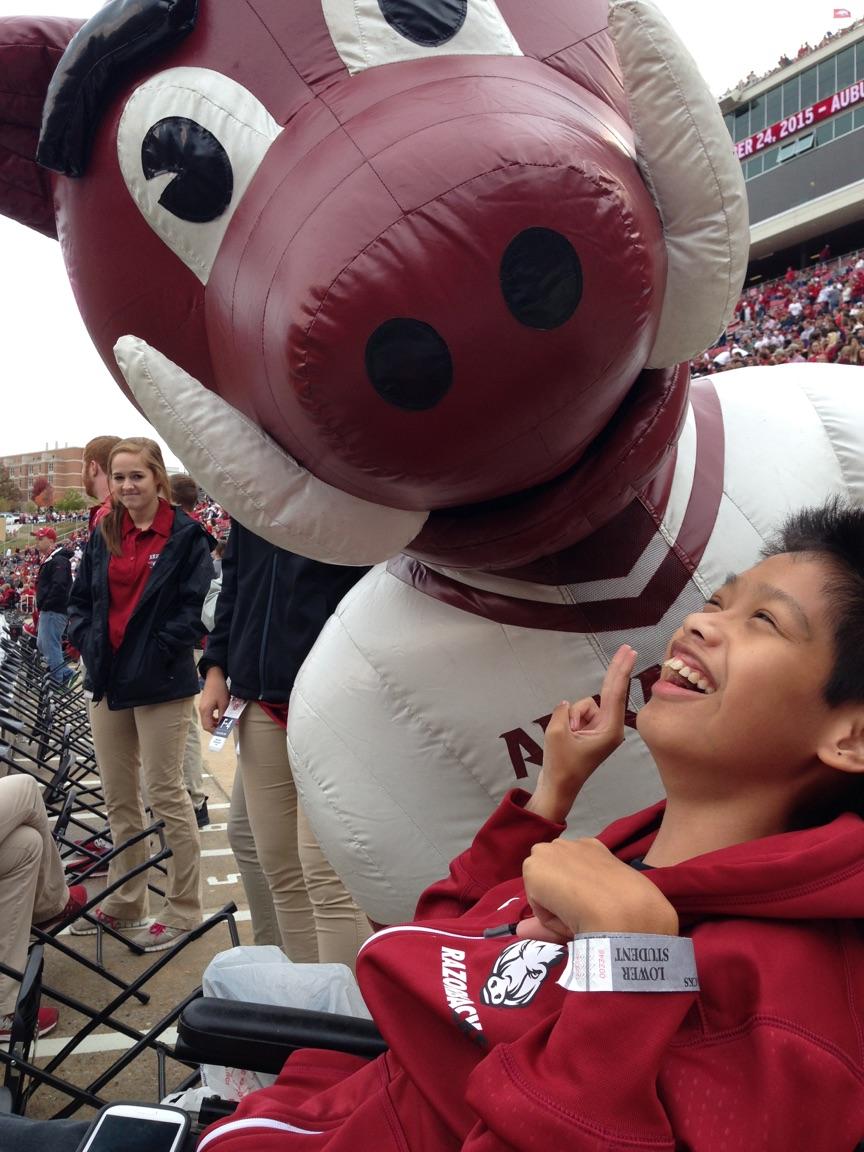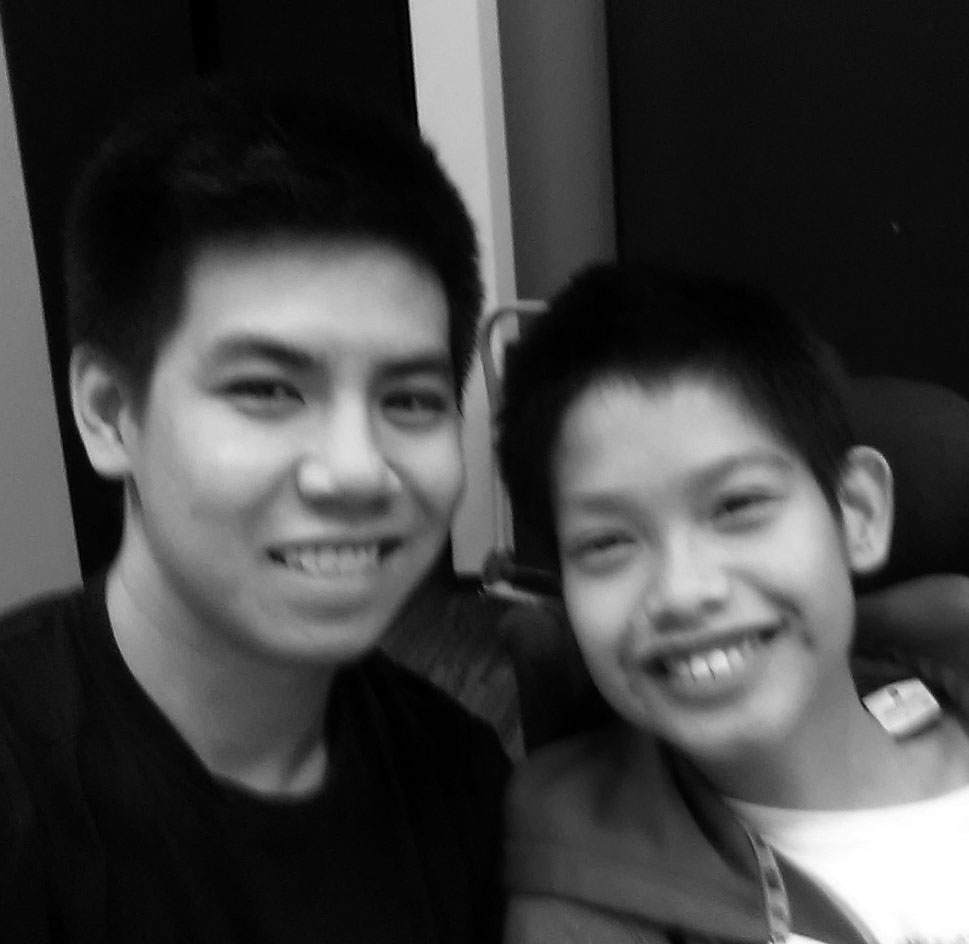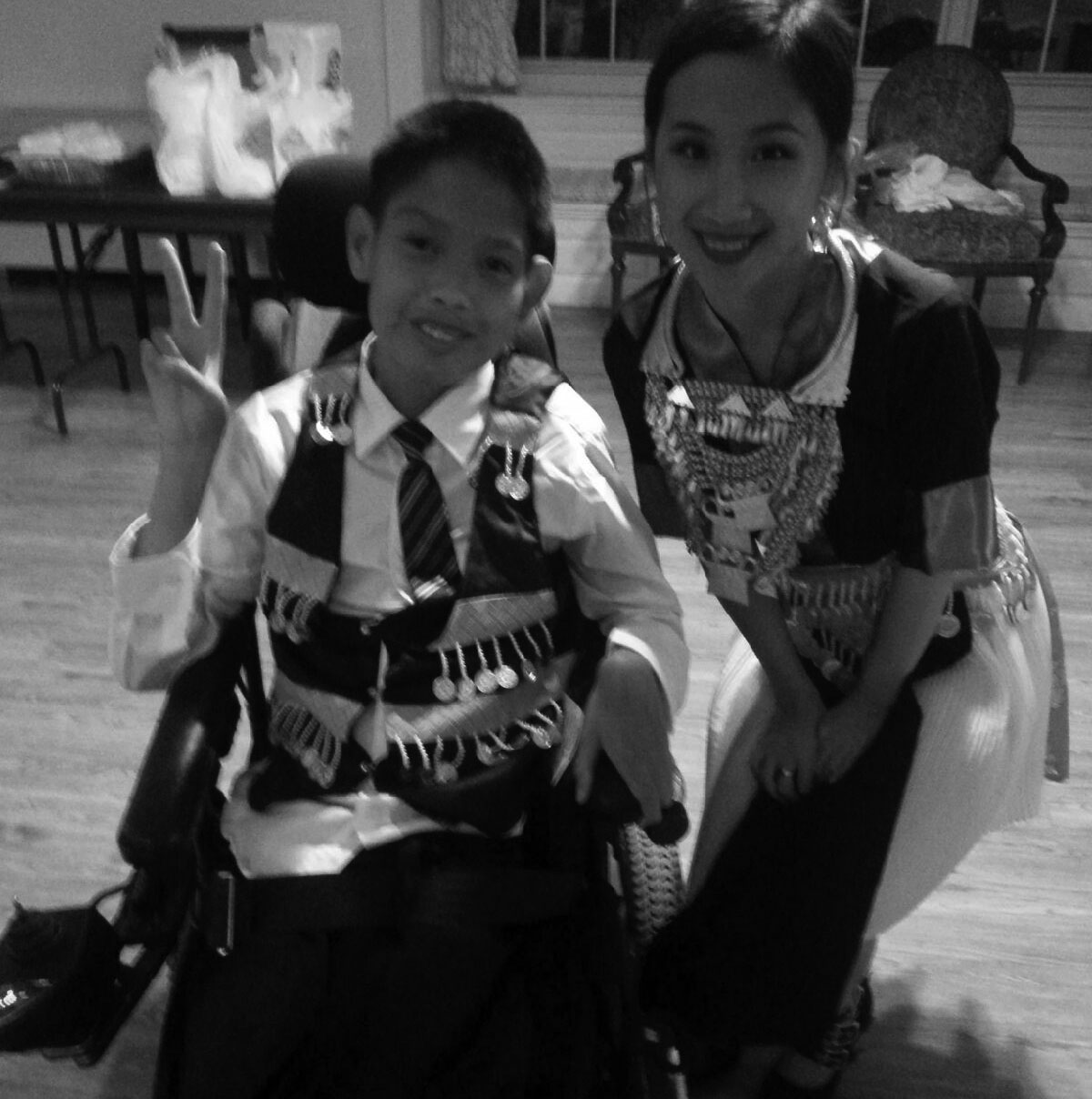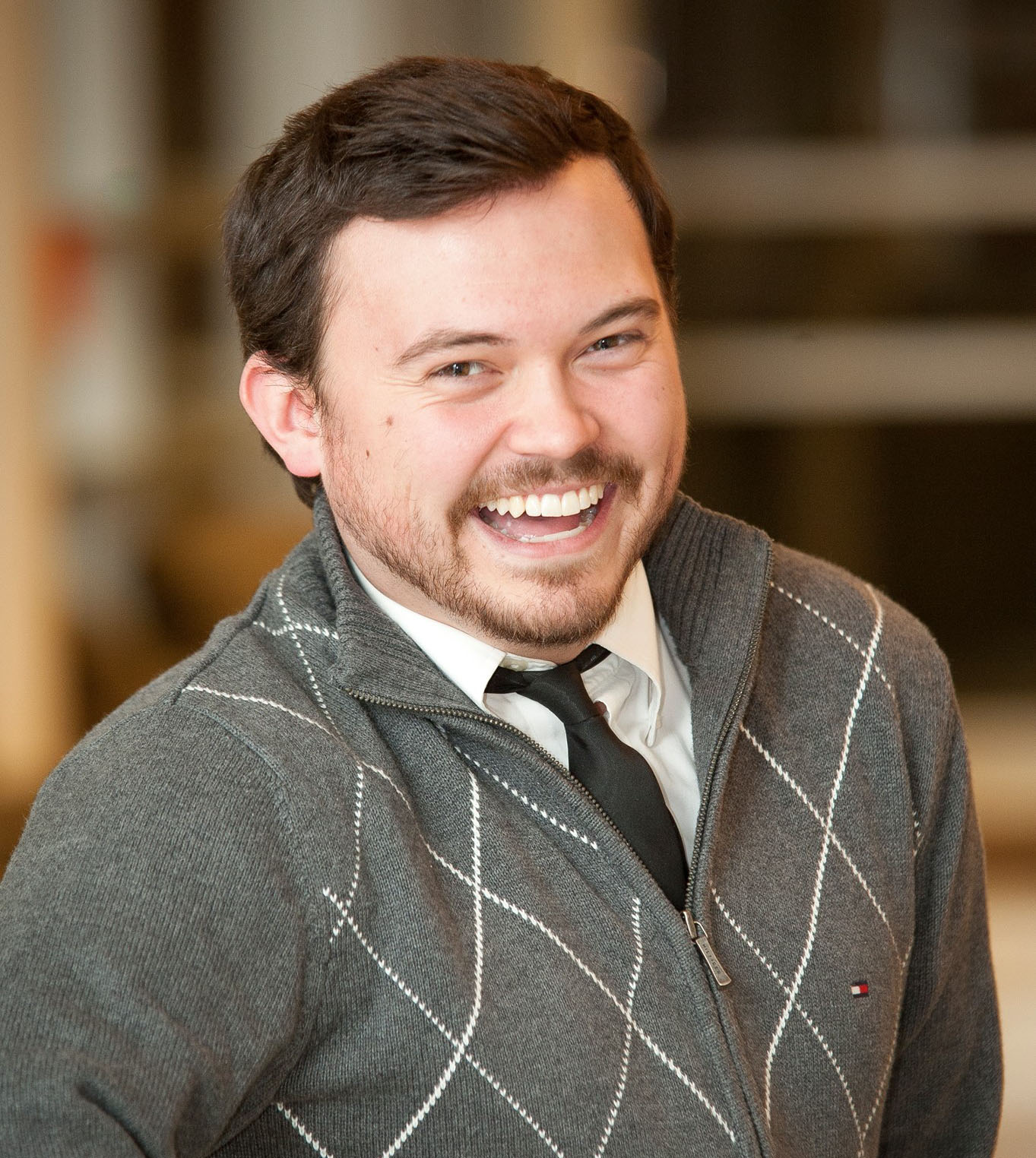Today’s college students face numerous challenges that are both unique and similar to those of generations past. Difficult class material, balancing personal relationships, demanding time management skills, meeting necessary financial burdens, and questions about the future daily weigh on undergraduates. But what happens when students have to take on extra challenges in the form of learning and accessibility issues?
Gordon Xiong, an undeclared junior at the University of Arkansas, knows about the burden of those additional challenges all too well. Relying on a wheelchair for mobility around campus, Xiong faces difficulties that effect very few of his peers.
Amazingly, Xiong remains active in his life as a Razorback, participating in campus events, excelling in his classes, and building relationships with his peers. In fact, life as a Razorback and the support services the U of A offers through the Center for Educational Access was what drew Xiong here in the first place.
“When it came time to look at colleges and universities, I did a lot of research because I knew it was a big decision,” Xiong said. “My rehab counselor told me about the excellent University of Arkansas support network, and once I looked into and saw how great it was, I knew. I knew it would be a good fit.”
Since arriving on the campus to start his college education, Xiong has fully immersed himself in college experience, which has led some unique and exciting highlights. But his academic achievements are some that Xiong is most proud of.

“I have run into some accessibility issues when trying to get around campus. Some of the older buildings weren’t built with consideration for students with disabilities. Everyone is very helpful and they do what they can, but sometimes it’s unavoidable.”
“Last year, I graduated from the Professional Development Institute, which is an 8-week intensive that teaches students a better way to be professional, write resumes, and explore interests,” Xiong said. “The training was so valuable and it was an honor to complete that program.”
Of course, his experience at the university has not been without challenges.
“I have run into some accessibility issues when trying to get around campus,” Xiong said. “Some of the older buildings weren’t built with consideration for students with disabilities. Everyone is very helpful and they do what they can, but sometimes it’s unavoidable.”
Xiong does hold onto a sense of humor even in the challenges however, and has become quite accustomed to seeing the positive in the difficult times.
“It amazes me how willing my classmates are to help and support me,” Xiong said. “Once when there was a power outage during class, my classmates carried me and my wheelchair down the stairs since there was no elevator. I’ll never forget that experience!”
In addition to the help offered by friends and classmates, Xiong also says he relies heavily on the wide-range of services offered by the Center for Educational Access.
“The CEA was influential for me even before I started school,” Xiong said. “Their programs and their commitment to students was one of the reasons I came to the U of A. Their help has surpassed what I could have expected, especially on an academic level. Without them I wouldn’t have my class notes or access to the information that I need. It would be completely different.”
Though appreciative for the assistance by the CEA, Xiong was still facing additional monetary expenses that were hindering his studies and ability to put in his best work. When the CEA staff told him about the Linda K. Overstreet scholarship, he immediately imagined all that receiving such help could mean.
“The semester before I heard about the scholarship, I couldn’t afford to get a meal plan,” Xiong said. “Even once I got a temporary one late in the semester, it ran out so quickly. My parents did all that they could to help, but I could see the burden it was placing on them and I felt how it was affecting me as well.”
As a student with disabilities in the 1950s and 60s, U of A alumnae Linda K Overstreet faced daily challenges like Xiong and his peers. Ms. Overstreet fought to overcome the barriers to her education in a time when access was not readily available., and her impact is still felt today. Late in her life, Overstreet chose to give significantly to U of A with the purpose of helping students with disabilities achieve greater success in their academic careers. Today, her scholarship is awarded to multiple students each semester through the CEA.
Eligible to apply for the scholarship, Xiong applied right away and quickly received the news that he was going to be a recipient. Now a two-semester recipient, he said that a significant weight has been lifted thanks to the generosity and legacy of Overstreet.
“Receiving the scholarship, it changed everything for me,” Xiong said. “It eases my parent’s worries, and it takes away my financial burdens so I can help to focus on school. It just allows me to do my best work and I’m so appreciative.”
As he continues his path towards his undergraduate goals, Xiong is keeping his spirit of thankfulness and his appreciation to the CEA and donors like Linda Overstreet. He says he thinks often about the significant impact their generosity has played in his academic success.
“If I had a chance to speak with Ms. Overstreet or any of the donors who have given, I would just say thank you so very much,” Xiong said. “It may sound overdone or trite but I don’t what I would do without them. Without their generosity it would be impossible for me to do my best at school, so I’m just incredibly thankful.”



“It amazes me how willing my classmates are to help and support me,” Xiong said. “Once when there was a power outage during class, my classmates carried me and my wheelchair down the stairs since there was no elevator. I’ll never forget that experience!”
In addition to the help offered by friends and classmates, Xiong also says he relies heavily on the wide-range of services offered by the Center for Educational Access.
“The CEA was influential for me even before I started school,” Xiong said. “Their programs and their commitment to students was one of the reasons I came to the U of A. Their help has surpassed what I could have expected, especially on an academic level. Without them I wouldn’t have my class notes or access to the information that I need. It would be completely different.”
Though appreciative for the assistance by the CEA, Xiong was still facing additional monetary expenses that were hindering his studies and ability to put in his best work. When the CEA staff told him about the Linda K. Overstreet scholarship, he immediately imagined all that receiving such help could mean.
“It amazes me how willing my classmates are to help and support me. Once when there was a power outage during class, my classmates carried me and my wheelchair down the stairs since there was no elevator. I’ll never forget that experience!”
“The semester before I heard about the scholarship, I couldn’t afford to get a meal plan,” Xiong said. “Even once I got a temporary one late in the semester, it ran out so quickly. My parents did all that they could to help, but I could see the burden it was placing on them and I felt how it was affecting me as well.”
As a student with disabilities in the 1950s and 60s, U of A alumnae Linda K Overstreet faced daily challenges like Xiong and his peers. Ms. Overstreet fought to overcome the barriers to her education in a time when access was not readily available., and her impact is still felt today. Late in her life, Overstreet chose to give significantly to U of A with the purpose of helping students with disabilities achieve greater success in their academic careers. Today, her scholarship is awarded to multiple students each semester through the CEA.
Eligible to apply for the scholarship, Xiong applied right away and quickly received the news that he was going to be a recipient. Now a two-semester recipient, he said that a significant weight has been lifted thanks to the generosity and legacy of Overstreet.
“If I had a chance to speak with Ms. Overstreet or any of the donors who have given, I would just say thank you so very much. It may sound overdone or trite but I don’t know what I would do without them. Without their generosity it would be impossible for me to do my best at school, so I’m just incredibly thankful.”
“Receiving the scholarship, it changed everything for me,” Xiong said. “It eases my parent’s worries, and it takes away my financial burdens so I can help to focus on school. It just allows me to do my best work and I’m so appreciative.”
As he continues his path towards his undergraduate goals, Xiong is keeping his spirit of thankfulness and his appreciation to the CEA and donors like Linda Overstreet. He says he thinks often about the significant impact their generosity has played in his academic success.
“If I had a chance to speak with Ms. Overstreet or any of the donors who have given, I would just say thank you so very much,” Xiong said. “It may sound overdone or trite but I don’t what I would do without them. Without their generosity it would be impossible for me to do my best at school, so I’m just incredibly thankful.”

Matthew Matney
Development Graduate Assistant, Division of Student Affairs
Matthew Matney is a graduate assistant with the Development office for Student Affairs at the University of Arkansas. Matt helps to tell the story of the Division of Student Affairs by highlighting outstanding students and featuring programs through his writing. Matt is pursuing his M.A. is Communications at the U of A.
Want to support students like Gordon Xiong?
Learn more about how your generous gifts can help support students like Gordon Xiong. For more information about giving to the Division of Student Affairs directly, contact Carolyn Collins at 479-575-5007 or by email at cdc008@uark.edu.
